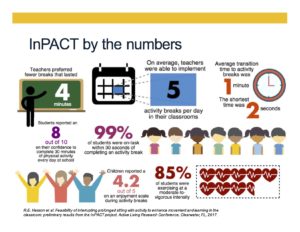Momentum Center Multi-Collaborative Projects
The Momentum Center has catalyzed two multi-collaborative projects that serve as a central focus for the Center’s diverse membership group.
Active Class Project
This project brings together 5 researchers from Architecture, Kinesiology, Public Health and Education to re-imagine the elementary classroom space as a place that will be more conducive to increased levels of physical activity throughout the school day. This work entails:
- Determining optimal levels of physical activity required to maintain an energy balance,
- Exploring possibilities for change in the classroom space, and
- Ensuring that proposed changes support requirements for pedagogy and classroom management as well.
A second phase of this project is the Interrupting Prolonged Sitting with Activity (InPACT) study. InPACT is a novel classroom-based physical activity intervention to improve the fitness of both teachers and st udents, while simultaneously improving academic achievement. The goal is to provide teachers with the necessary resources and instruction to lead their classes in 10, 3-minute activity breaks throughout the school day. These short duration activity breaks closely represent children’s natural physical activity patterns and may be an effective tool at energizing and motivating students to be physically active.
udents, while simultaneously improving academic achievement. The goal is to provide teachers with the necessary resources and instruction to lead their classes in 10, 3-minute activity breaks throughout the school day. These short duration activity breaks closely represent children’s natural physical activity patterns and may be an effective tool at energizing and motivating students to be physically active.
For more information, visit the InPACT site.
- Weston E, Nagy M, Ajibewa TA, O’Sullivan M, Block S, Hasson RE. Acute effects of interrupting prolonged sitting with intermittent physical activity on blood pressure in preadolescent children. Pediatr Exerc Sci. 2019. [Epub ahead of print]
- Block SS, Tooley TR, Nagy MR, O’Sullivan MP, Robinson LE, Colabianchi N, Hasson RE. Acute effect of intermittent exercise and action-based video game breaks on math performance in preadolescent children. Pediatr Exerc Sci. 2018; 30(3):326-334.
- Ajibewa TA, O’Sullivan MP, Nagy MR, Block SS, Tooley TR, Robinson LE, Colabianchi N, Hasson RE. The effects of interrupting prolonged sitting with intermittent activity on appetite sensations and subsequent food intake in preadolescent children. PLoS One. 2017; 12(12):e0188986.
- O’Sullivan MP, Nagy MR, Block SS, Tooley TR, Robinson LE, Colabianchi N, Hasson RE. Acute compensatory responses to interrupting prolonged sitting with intermittent activity in preadolescent children. Pediatr Exerc Sci. 2017; 30(2):259-265.
- Nagy MR, O’Sullivan MP, Block SS, Tooley TR, Robinson LE, Colabianchi N, Hasson RE. Affective responses to intermittent physical activity in healthy weight and overweight/obese elementary school-age children. J Phys Act Health. 2017; 14(11):845-851.
- Vance US, Hasson RE, Ransier B, Stockdill D. Move Detroit: An Active Class Space Intervention. 105th Association of Collegiate Schools of Architecture Annual Meeting and Technology Conference Proceedings. March 2017.
Healthy Families Project
The University of Michigan Momentum Center Healthy Families Project is an interdisciplinary project integrating the perspectives of 10 researchers representing Medicine, Kinesiology, Nursing, Public Health, Communications Studies, and Psychology. It is exploring multiple aspects of a child’s biology, diet, physical activity, environment and family relationships in order to develop a phenotype of children according to the strength of their observable satiety cues. This phenotype will support the development of tailored interventions that can help parents better guide their children through healthy growth and development.
The study included:
- Structured interviews
- Use of actigraphy equipment to collect data regarding daily physical activity of the child and parent
- Collection of saliva for epigenetic and fatty acid analyses
- Epigenetic analysis of neonatal blood spots obtained from the Michigan Neonatal Biobank in order to assess the impact of environment, nutrition, and behaviors on epigenetic expression over time.
- Kochmanski J, Goodrich JM, Peterson KE, Lumeng JC, Dolinoy DC. Neonatal bloodspot DNA methylation patterns are associated with childhood weight status in the Healthy Families Project. Pediatr Res. 2019; 85(6):848-855.
- Schulte EM, Jacques-Tiura AJ, Gearhardt AN, King S. Food addiction prevalence and concurrent validity in African American adolescents with obesity. Psychol Addict Behav. 2018; 32(2):187-196.
- Song M, Dieckmann NF, Stoyles S, Kim Y, Lumeng JC. Associations between mother’s and children’s moderate-to-vigorous physical activity and sedentary time in the family context. Prev Med Rep. 2017; 8:197-203.
- Ketcheson L, Pitchford EA, Kwon HJ, Ulrich DA. Physical activity patterns in infants with and without down syndrome. Pediatr Phys Ther. 2017; 29(3):200-206.
- Pitchford AE, Ketcheson LR, Kwon HJ, Ulrich DA. Minimum accelerometer wear time in infants: a generalizability study. J Phys Act Health. 2017; 14(6):421-428.
- Roach E, Viechnicki GB, Retzloff LB, Davis-Kean P, Lumeng JC, Miller AL. Family food talk, child eating behavior, and maternal feeding practices. Appetite. 2017; 117:40-50.
- Richmond RL, Roberto CA, Gearhardt AN. The association of addictive-like eating with food intake in children. Appetite. 2017; 117:82-90.
- Acharya Y, Norton EC, Lumeng JC. The effect of financial compensation on willingness to supply a child’s blood sample: a randomized controlled trial. Eval Health Prof. 2017; (40)3:359-371.
- Miller AL, Ellis A, Domoff SE. Food talk in families. In: Davis-Kean, P, Tang S, editors. Socializing children through language: Academic Press; 2016, p.147-176.

